The woman left scarred by herbal medicine: Like thousands, Nilufer took St John’s Wort to help boost her mood… but little did she know she’d suffer a shocking side-effect
- Nilufer Atik, 39, bought the capsules to deal with her mild depression
- When she went on holiday to Turkey dark patches appeared on her skin
- She found out that the same had happened to others using St John’s Wort
128
View comments
When Nilufer Atik’s doctor recommended she try the herbal medicine St John’s Wort for her mild depression, she gave it a go.
‘A close friend had passed away and I wasn’t sleeping,’ says the 39-year-old fitness coach from London. ‘From being happy-go-lucky, I was permanently down and tearful. I could have tried counselling, but I wanted a natural approach.’
She bought the capsules on the High Street, where they are readily available, and was careful to follow the correct dosage.
Scroll down for video
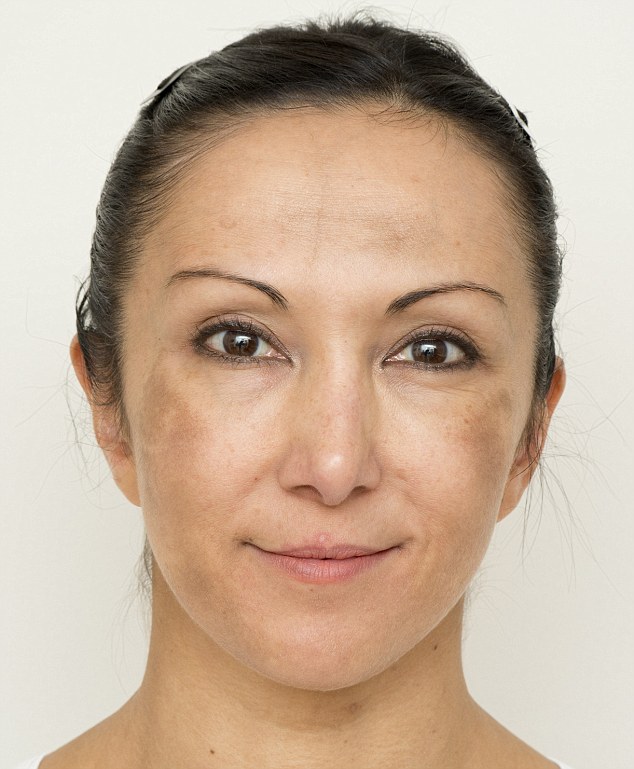
Nilufer Atik, 39, (pictured) bought the St John’s Wort capsules to deal with her mild depression. When she went on holiday to Turkey dark patches suddenly appeared on her skin
Three months later, still feeling down, she went on holiday to Turkey. She wore SPF30 sunscreen throughout but returned with strange, dark patches on her skin. ‘They were really noticeable on my face, back, stomach and sides of my arms,’ she says.
Nilufer went to a doctor, who gave her some antibacterial cream but the more her tan faded, the more the marks showed. Searching for a possible cause, she went online and found the same big brown skin patches had happened to others using St John’s Wort.
‘It said on the label that it could cause mild photosensitivity, but I didn’t think it was a big deal. I’m not daft with sun cream and was really careful — but it was too late. ’
Nilufer was a victim of our growing obsession with herbal medicines, with many people choosing them over conventional treatments. Despite the NHS’s warning that ‘being ‘natural’ doesn’t necessarily mean they’re safe or indeed effective, we now spend £75 million a year on herbal cures.
It’s a deeply controversial idea and, alongside more minor cases such as Nilufer’s, there have been reports of people suffering liver damage, paralysis and even death after taking powerful herbal medicines from unlicensed herbal practitioners.
Despite this, herbal medicines such as St John’s Wort, aniseed and echinacea are readily available from many pharmacies. And their popularity has meant a surge in ‘medical herbalists’ who, like doctors, diagnose ailments then prescribe and mix up herbal medicines.
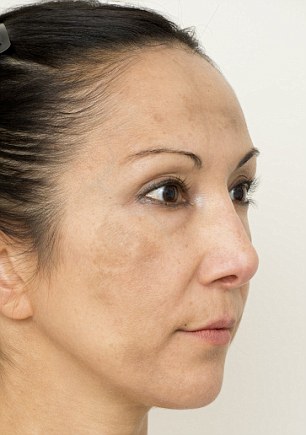
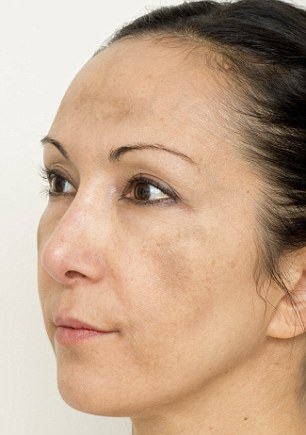
Both sides of Nilufer’s face can be seen here without make-up. She says she has to use heavy stage make-up to cover her dark patches as well as wearing SPF50 throughout the year to avoid the areas darkening
There are now 2,500 medical herbalists in the UK, according to the Department of Health, and a slowly growing number of clinical trials stacking up positive results.
Plants, botanical exponents say, provide a gentler, more natural and sustainable means of rebalancing health and wellbeing and cost far less than conventional medicines. Many bottles of herbal pills and potions cost less than £10 and last for months.
But experts warn that many herbal cures are at best unproven, and at worst dangerous. Professor Edzard Ernst, the world’s first professor of complimentary medicine, says: ‘The assumption that because herbal medicines are natural, they are safe, is not just wrong, it is dangerous.
I had perfect olive skin, but now I wear thick stage make-up to cover the pigmentation marks and SPF50 throughout the year — even on the dullest days — otherwise, it gets worse.Nilufer Atik‘Some plants are poisonous, some interact with prescribed medicines, some are contaminated, and most aren’t effective as advertised — and whenever an ineffective treatment replaces an effective one for a serious condition, lives are in danger.’
There are also warnings that herbal medicines can interfere with other medicines — for instance, St John’s Wort makes the Pill work less effectively, while garlic and ginkgo biloba can prevent blood clotting which can be a problem before an operation.
For Nilufer, discovering her herbal medicine came with severe side-effects came too late.
Studies found that St John’s Wort’s active ingredient hypericin can react with light to produce free radicals that damage cells of the body, causing photosensitivity in some people.
Since then, Nilufer has spent £3,000 on numerous specialists, laser treatment, skin bleaching, collagen tablets, pigmentation creams, facials and microdermabrasion, to no avail.
‘I had perfect olive skin, but now I wear thick stage make-up to cover the pigmentation marks and SPF50 throughout the year — even on the dullest days — otherwise, it gets worse. I look so much older and it really bothers me. I get up before my boyfriend so he doesn’t see me without make-up.’
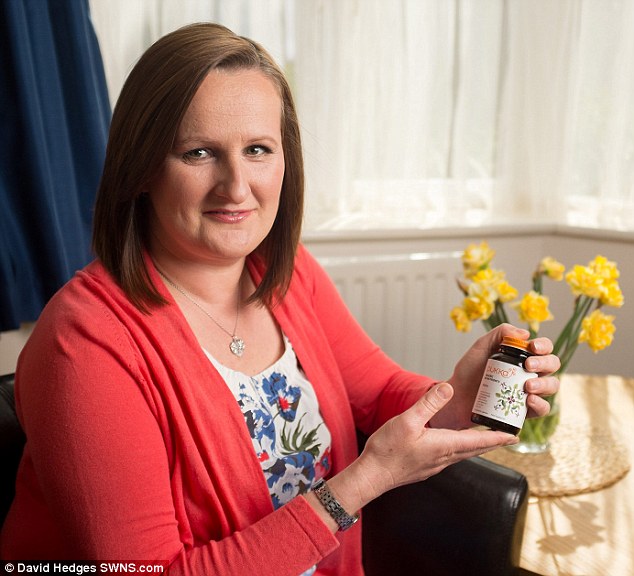
Gabriela Slater, 40, (pictured) is a reflexologist at Nu Reflexology in Wiltshire. Gabriela uses a cocktail of herbal medication and her favourite is extract of milk thistle, which she buys over-the-counter
There’s little she can do now, but Nilufer feels people’s perceptions of herbal medicine need sharpening. ‘No medication is 100 per cent safe, but don’t think just because it is herbal and over-the-counter it’s not a drug. It is. It might do more harm than good.’
However, such warnings can’t put off many of herbal medicine’s devotees, including Sharon Shanahan, 44. Every morning, she takes a tincture of chamomile, St John’s Wort, ashwagandha, pasque flower and agnus castus, designed to boost her mood and strengthen her immune system.
It was prescribed by a medical herbalist, a practitioner who uses plants, bark, roots and flowers to cure health complaints. So far, it has had such a beneficial effect that she’s also tried herbal medicines on husband Paul, 42, a carpenter, and their young sons.
She first tried herbal medicine three years ago when caring for Benjamin, now 13, Callum, ten, and Sam, eight, became too much. ‘I was working as an accounts administrator and balancing things at home. I got pins and needles down my arms and headaches through stress. I didn’t want anti-depressants because I was worried about side-effects.’

Gabriela is seen here before she started using herbal remedies. She first tried herbal treatments ten years ago to deal with the irregular periods she had as a result of polycystic ovary syndrome
Sharon had read about Anne Marie Reilly, a medical herbalist, and made an appointment.
‘I’d bought vitamins over-the-counter, but never tried anything like this before. It cost £35 for the session and we spoke for over an hour in her office, going through my health problems, diet and lifestyle before being prescribed the tincture. It took a couple of months, but it has worked wonders. Now I’m doing two jobs and feel much more energetic.’ Sharon has put her children on herbal cures, too. The cost to the family is £50 a month, that’s £1,800 over three years to treat all of them.
‘Before taking herbal medicines all three boys were often catching colds, but they are now much better and haven’t needed to see the doctor for two years.
‘Sam had mild eczema on his legs and arms. Within three weeks of taking the wild flower heartsease, his complexion changed and the eczema improved. From looking washed out, he had colour in his cheeks and was glowing.’
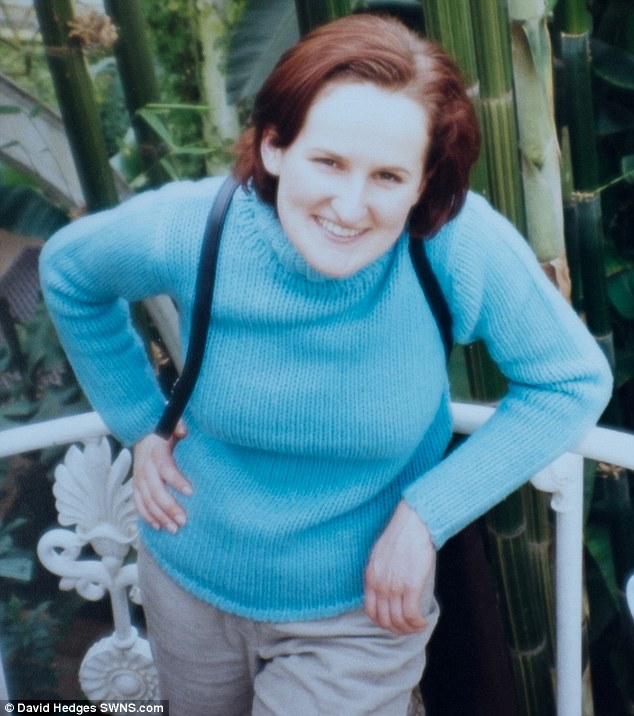
Gabriela (pictured) used the herbal remedy agnus cactus and made some changes to her diet in an attempt to get pregnant
The NHS warns that the safety of herbal medicines has not been proven in children and adverse reactions to herbs such as nausea, abdominal pain, vomiting or liver damage are well documented.
But despite herbology’s detractors, herbalist Anne Marie feels it has an important place in modern medicine. ‘Orthodox medicine is a lot to do with symptom control. It’s useful for acute situations such as serious infections or cancer, but when people have more chronic or complex conditions the more holistic approach of herbal medicine can have a better effect.’
Gabriela Slater, 40, a reflexologist at Nu Reflexology in Wiltshire, uses a cocktail of herbal medication. Her favourite is extract of milk thistle, which she buys over-the-counter.
‘I use it to support my liver function and take it four times a year as a detox when I need a boost. I feel cleaner, my skin looks brighter and I have more regular bowel movements. It’s a great way to cleanse the system.’
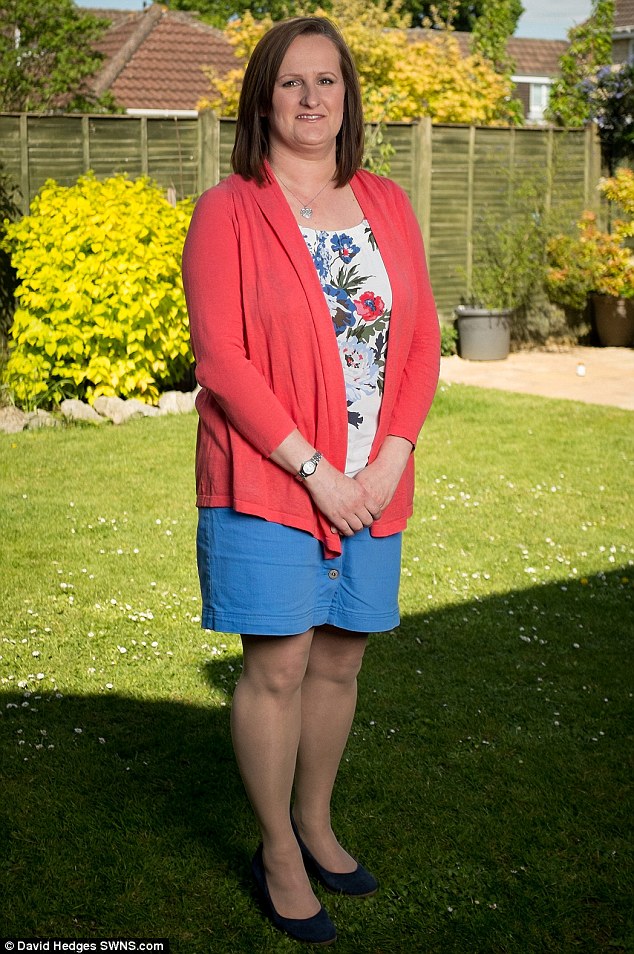
Three months after Gabriela (pictured) started taking agnus cactus she was pregnant with her daughter, Elizabeth
She also took agnus castus (known as wild lavender) ten years ago. ‘I used it when I was diagnosed with polycystic ovary syndrome to regulate my monthly cycle and help me conceive. I’d suffered irregular periods my whole life and while there were a number of medical treatments, I wanted something more natural.’
Combined with a few dietary changes and nutritional supplements it worked, and three months later Gabriela was pregnant with Elizabeth. ‘While I can’t say for definite whether it was down to the agnus castus, I feel sure that it contributed a great deal.’
Any herbal medication bought over-the-counter or online in this country, by law, must have a THR (Traditional Herbal Registration) stamp; the sign it has been assessed against quality and safety standards — though it’s no guarantee that it’ll work.
However, medical herbalists are unregulated. At the moment, anyone can set up a website and start making and selling cures (provided they have one-to-one consultations beforehand and make the medicines on their premises).
Understandably, most herbalists are keen to stamp out rogue traders, but in a report in March, the Government backtracked from statute regulation (something the Secretary of State promised in 2011), advising voluntary regulation instead.
The problem is that a lack of regulation means stories such as Nilufer’s may become more common as our love of all-natural cures continues to flourish.
When she went on holiday dark patches appeared on her skin. She found the same had happened to others using St John’s Wort.
Source: Nilufer Atik took St Johns Wort to boost her mood but it had a side-effect | Daily Mail Online
 Can you guess which of these women spends £1,000 a time at…
Can you guess which of these women spends £1,000 a time at…  Adventures of an internet shopping virgin, aged 63: Linda…
Adventures of an internet shopping virgin, aged 63: Linda…  Rowan Pelling’s sex column: Should I hide my racy past from…
Rowan Pelling’s sex column: Should I hide my racy past from…